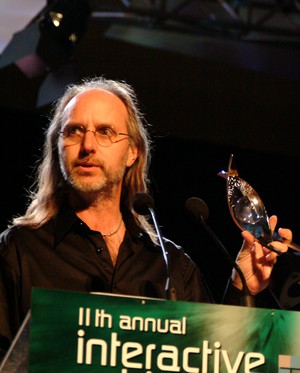
Rich Hilleman is a member of the Academy of Interactive Arts and Sciences where he serves as one of its board directors. He works for Electronic Arts.
Q: What's your favorite part of game development?
A: Discovery of Fun. I think you can understand how elements combine to be successful, in the same way that you can create a recipe by chemistry. There are many elements, and as a result nearly infinite possibilities. The Art is in anticipating the results of a new combination and understanding what that means for feedback systems, game mechanics and marketing concepts. Those second order effects are where the magic is...
Q: How do you measure success?
A: Impact = change x the number of people impacted.
Q: What’s the one problem of game development you wish you could instantly solve?
A: Scope and Scale, and the impact that has on gameplay. Scope and scale issues at my shop are the price of compromise. The bigger the product budget, the more people you have to please to get it made and sold, the more defused the product’s center becomes. If it isn’t internal resources, it is marketing support. If it isn’t marketing support it is what a retailer will or won’t carry based on their customer modeling. This is a pretty intractable problem, and bigger budgets and more expensive console price points make it worse...
Q: What game are you most jealous of?
A: Brain Age. I would like to be in a business where my game is prescribed by doctors – like Bayer Aspirin was to my dad after his stroke – this is how you impact the world (and the bank account).
Q: On a practical basis, what’s the one thing you’re going to tackle next?
A: Turning Game Design and Production from a craft to a profession. Currently, there is no industry accepted curriculum for Game Design or Production. It is a product of universities trying to repurpose existing courseware, or attempting to offer what they think students want...we need some common experiences that all professionals have as common context. Economics is nowhere without the basis of Adam Smith, English Lit is nowhere without Shakespeare, Music Theory doesn’t exist without Bach.
The individuals don’t matter but the common framework of expertise does. Right now, there isn’t even a common language to articulate the pieces and their relationships.
Q: Are games important?
A: Fun is important.
Q: Do you think it’s important for developers to continue playing games?
A: Not sure I understand how you could build something without playing it, but it is important to understand the player context that your game will be experienced in, and then forget it and do the best game YOU can.
Q: Tell us one of your recent professional insights.
A: Platforms are no longer hardware or software, they are communities. I think Engineers are the least important of those impacted—this is about Design, Production and Marketing First. Content will be next and traditional game programming will be last.
Q: What's the biggest challenge you see facing the industry?
A: Digital Distribution and the Retail Channel. Direct Customer relationships change literally everything, and the process of that transition will be very messy. GameStop is due for its “Tower Records Moment.” Traditional platform owners will find their walled gardens restrictive. Ubiquitous gaming will enable a whole new group of customers who don’t have time for five-hour sessions of the ten-foot experience.
Q: Finally, when you look at the future is there one great big trend that effects everyone?
A: Persistence – Who I am and what I have done is my handle, my history and my asset in a persistent gaming environment. Persistence in this case means that I have a gaming experience that pervades my media devices and maintains my context and progress across those device.